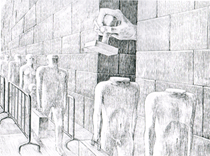
 The notion of common good is withering to the point of becoming no more than a mere ersatz of a formerly inspired philosophical and political thought.
The notion of common good is withering to the point of becoming no more than a mere ersatz of a formerly inspired philosophical and political thought.
For a certain time – which has been relatively limited in history – it was mantained, not without reason, that the contemporary foundation of the common good rested on the injunction of the Universal Declaration of Human Rights proclaiming that « all human beings are born free and equal in dignity and rights ».
The spirit and letter of this humanist aspiration seem nowadays to be strangled into silence and duplicity in the name of a certain progress for which the economy couldn’t stand the accomplishement of such an ambition. More
 A recent paper by two scholars of the University of London on behalf of the Education International highlights the creeping privatization of public schooling.
A recent paper by two scholars of the University of London on behalf of the Education International highlights the creeping privatization of public schooling.
According to the paper’s authors, privatization takes to complementary forms. On one hand, ideas, techniques and practices of the public educational sector come from the world of private enterprise. On the other hand, public education opens up more and more to the private sector by the means of outsourcing and public-private partnerships. More
 In the United States, the financing of educational “districts” by the federal government is tied to the pupils’ good performance in reading and mathematics. A recent study has shown that in the face of this constraint, imposed by the “No Child Left Behind Act”, educational authorities tend to increase teaching time in these areas and to reduce proportionately the time dedicated to other areas of learning, such as history, citizenship education and the arts, which are henceforth relegated to the bottom of the list of priorities. More
In the United States, the financing of educational “districts” by the federal government is tied to the pupils’ good performance in reading and mathematics. A recent study has shown that in the face of this constraint, imposed by the “No Child Left Behind Act”, educational authorities tend to increase teaching time in these areas and to reduce proportionately the time dedicated to other areas of learning, such as history, citizenship education and the arts, which are henceforth relegated to the bottom of the list of priorities. More
